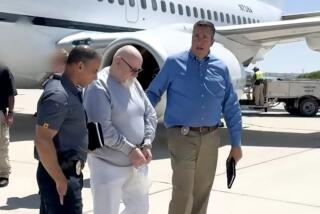Texas death row inmate’s final request: DNA testing
- Share via
Reporting from Washington — Texas death row inmate Hank Skinner, convicted of murdering his girlfriend and her two sons 16 years ago, has only one request before he is executed next week.
He says the state should be required to do DNA tests of evidence from the victim, such as semen and blood under her fingernails, that could prove, once and for all, who was the real killer. His lawyers do not say they are certain he is innocent. They are certain, however, that no one should be put to death without testing crucial evidence that could show the wrong man was convicted.
Skinner has asked the U.S. Supreme Court to block the execution, set for Wednesday, to permit time for the testing.
Skinner was an obvious suspect in the murder of Twila Busby on New Year’s Eve 1993. He had been drunk and asleep on her couch shortly before she was strangled and clubbed to death in the same room. Her blood as well as that of one of her dead sons was found on his clothes. Skinner insists he awoke in a stupor to find his girlfriend murdered, and he maintains that her uncle was the killer.
“The state of Texas is trying to kill me for something I didn’t do,” Skinner said in a recent taped interview from prison. “We are asking to test all the evidence they identified as important.”
Skinner left a trail of blood as he staggered from Busby’s house in the north Texas town of Pampa. He said he had cut his hand on a broken bottle when he fell off the couch, and his bloody palm prints were found near the victims.
But police and prosecutors did not test other evidence from the crime scene, including a vaginal swab from the victim and her fingernail clippings. It appeared as though she had been raped and struggled with her killer.
Busby had left a New Year’s Eve party before midnight after her drunken uncle made rude sexual advances.
Two bloody knives also went untested, even though her 20- and 22-year-old sons had been stabbed to death. Skinner’s appointed defense lawyer could have had this evidence tested prior to the trial, but he did not do so.
“In any investigation today, all of this evidence would have been tested for DNA,” said Rob Owen, a University of Texas law professor who now represents Skinner. “But why not do the testing now?”
Prosecutors declined to comment. But they, and some of the judges who have ruled on his appeals, said that because Skinner’s trial lawyer did not ask for the extra DNA testing, it was too late now. Other judges said that because they saw “ample evidence” of his guilt, no further testing was required. In January, a magistrate rejected Skinner’s final appeal.
Doubt arose about Skinner’s guilt 10 years ago after an investigation by students from the Medill Innocence Project at Northwestern University. They found another ex-girlfriend who had seen Skinner shortly after the murders and said he was too drunk and disoriented to have killed three people, including one son who stood 6-feet-6 and weighed 225 pounds. She also said Skinner did not have cuts or scratch marks, as would have been expected after a struggle.
The students also found a neighbor of the uncle who said he had cleaned his van and removed the carpet a day after the killings. The uncle did not come under investigation, and later died in an auto accident.
Skinner’s current lawyers have asked Gov. Rick Perry to postpone the execution for a month to allow for the testing. They also asked the high court for an emergency order to block the execution.
Owen said that if blood or skin from the victim’s fingernails has DNA matching Skinner’s, it would confirm his guilt. If the test finds the DNA of another man, “I think that exonerates him,” he said.
Skinner’s appeals run squarely into a 5-4 ruling from the Supreme Court last year saying the Constitution does not give convicts the right to demand DNA testing of crime-scene evidence. But that case involved a paroled rapist in Alaska, not a prisoner facing execution with evidence still untested.
More to Read
Sign up for Essential California
The most important California stories and recommendations in your inbox every morning.
You may occasionally receive promotional content from the Los Angeles Times.














